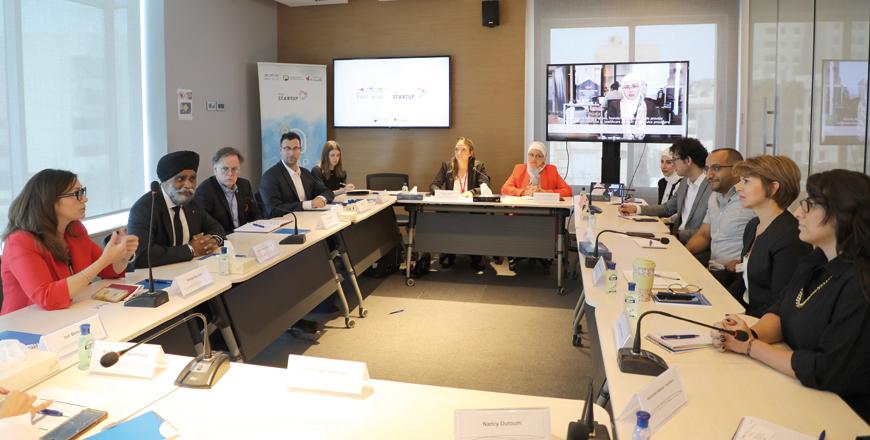You are here
Injaz conference addresses role of media, youth towards economic growth
By Bahaa Al Deen Al Nawas - Oct 10,2019 - Last updated at Oct 10,2019

Established and rising entrepreneurs on Monday gathered at INJAZ’s mySTARTUP business incubator in Amman (Photo courtesy of INJAZ)
AMMAN — Established and rising entrepreneurs on Monday gathered at INJAZ’s mySTARTUP business incubator in Amman to highlight their work and innovations at an event titled “The role of Media in Empowering the Entrepreneurial Ecosystem”.
INJAZ CEO Deema Bibi said the business incubator started with only a few young people and has branched out to schools, universities, colleges, youth centres and vocational training centres.
“Our aim is very clear; to connect young people, enable and motivate them to be active and productive members of the labour market and contribute to the national economy, which we do through our various programmes and activities conducted at all our locations,” Bibi said.
In the past six years, two global companies conducted an impact study on INJAZ’s work. The results revealed that 90 per cent of INJAZ graduates were employed within a few months of graduation.
Citing the Department of Statistics, Bibi said 70 per cent of young Jordanian graduates spend over a year searching for a job, a period of time during which they are neither part of the education system nor the economy.
Injaz works to enable youth by teaching them necessary skills for employment and entrepreneurship.
“They should know that it is okay to try more than once in order to succeed,” Bibi noted.
The incubator’s CEO shed light on the disparity between the high demand and low supply of jobs in the Kingdom, noting that employment is the most important reason behind entrepreneurship, along with training youth on methods to realise their business ideas.
Bibi said that the process of teaching new entrepreneurs tackles community building, collaboration and advocacy, the role of women-led businesses and inclusivity, as well as social and environmental responsibility.
Bibi said INJAZ focuses on women’s entrepreneurship starting in schools and universities. The incubator also seeks entrepreneurs from areas outside of Amman to promote inclusivity, she added.
The incubators aims to have 40 per cent of its start-ups from outside the capital city, focusing on marginalised and people with disabilities, among others.
Haya Bustami, community outreach manager at INJAZ, said in September and October of last year that the incubator hosted 70 start-ups, of which 55 will graduate in November, 23 are women-led, 11 are social enterprises and four work on environmental solutions.
INJAZ targets youth between the ages of 20 and 35, Bustami said, noting that the incubator has held over 70 training sessions, 60 consultation hours and over 100 mentoring sessions.
Bustami highlighted the role of media as a tool that advocates for entrepreneurship to accelerating the national economy, creating an entrepreneurial mindset among youth and policy-makers, and attracting local and foreign investments.
Murad Awad, research and development director at INJAZ, hosted a panel discussion on the role of media in boosting the work of four start-ups.
On the sidelines of the event, Ahmad Abualfeilat, co-founder of LessGo, told The Jordan Times that the start-up serves as a platform to connect passengers with public transportation options for the sake of social collaboration and environmental protection.
“The platform is expanding, and our main concern is maintaining the safety of our users, especially as we are currently focusing on university students,” Abualfeilat said, noting that the project will start with the German Jordanian University and expand from there.
He underlined that the start-up aims at enhancing the thought of social collaboration.
Fadi Aljawabira, founder of Rewayte, a part of the INJAZ MyStartup Incubator, said that his enterprise supports young writers by connecting them with Arabic proofreaders and editors as well as designers.
Rewayte, funded by the Dutch embassy and the Sharakah programme, also helps readers exchange hard-copy novels in Arabic and English, according to Aljawabira, who added that academic books will be part of the initiative as well.
“We are here at the event to introduce our idea and reach the public through the media, as we believe in the media’s important role in boosting the entrepreneurial scene in Jordan,” he added.
Related Articles
AMMAN — Canadian Minister of International Development Harjit S.
AMMAN — INJAZ held its Annual Business and Social Entrepreneurship National Competition recently, which aims at evaluating entrepreneurial p
AMMAN — Al Hussein Technical University (HTU), one of the Crown Prince Foundation's initiatives, and INJAZ on Saturday signed a memorandum o

















